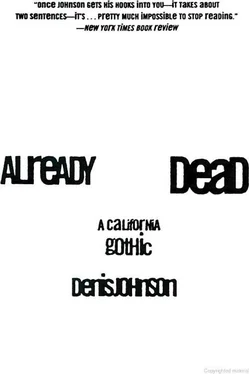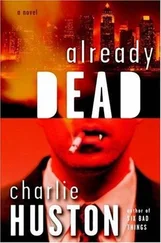That’s what I wanted in life, still want, I want blue light on their breasts, wet sorrows, endnesses, endnesses, death after every satisfaction—
(Nobody was enough. Not Melissa. Not for long anyway. And never you, Winona. But you knew that. I just wanted to live as long as possible coursed through by that electric intoxication)—
I can’t tell you how ordinary everything seemed at the fourplex movie house, or, I don’t know, fiveplex — but this is important. Everybody moved, waited, ruminated, conversed — at the popcorn or 144 / Denis Johnson
the tickets or the advertisements or the bathrooms — the same as always when I paid my money for a courtroom drama, because I like the talking in those things, and headed through a little traffic jam near the drinking fountain. And I stepped into this group and almost tripped over the legs of a woman lying on the floor in their midst. A dead woman. Such revelations in the parted crowd! — I hadn’t thought anything hidden here, certainly not this corpse of an elderly female with its blouse torn open and its gray-green face, not these two or three paramedics, one of them holding an IV jug up above the dead old woman’s head, another bending to put a pair of those small hand-held flatirons against her breast and jolt her with charges from a small portable defibrillating machine. I caught a glimpse of worried faces, a middle-aged daughter and a son-in-law, I believed, and I turned away. Everybody had turned away. The lobby went on as usual. Out of a general, a profound, an aboriginal politeness, we went on in fact much more usually than usual.
Submitting to the same instincts I went into the bathroom and washed my hands…
Five minutes later, when I came out, the group around the woman had moved back a little. One paramedic was speaking to another while glancing at his watch, and the second, crouched there with a clipboard resting on his knee, wrote down the time. — Jan? Jan? — a third was saying to the victim, who sat up now looking at him with not much more than an animal in her eyes, — Can you hear me, Jan? Can you hear me? — They’d brought her back to life. Can you hear me, Winona? The dead woman was alive again.
And that’s not all that happened in that theater that day. In fact I witnessed a panic in the darkness just minutes later. But I’m too tired to tell you about it. Enough to say I got my money’s worth at the movies, and then I called Louise. Precisely as I used to walk to the pay phone when I was eleven and call her and say, — Mom? It’s over. Come and get me — I dialled her number now. She met me at a tearoom, where I watched her eat Welsh rarebit. She works in a prison you know. She still loves Father I think. Also, maybe more so, the booze: on her cheeks and nose the trailing burst capillaries (I’ll have them too before it’s over) like faint grape stains. She’s so fed up with herself she often pretends to be someone out of a book, copping monologues right out of Jane Austen, Dickens, Jack London…like me, a reader and a drinker. Especially fond of the introductory lines,
Already Dead / 145
when someone first appears on the stage. She probably puts on a whole new self — more real? or more false? — to go to work at the joint. Five days a week bossing lady criminals around, most of them nymphoma-niacs, most of them abused a hundred ways since birth, most of them only half awake. I can’t imagine what she does there but I sense without being able to explain why that these are the happiest and most worth-while days of her life, I sense that she’s helped people. Her blind hands groping to find their hands. Everybody lost together behind great cold walls.
Anyhow she’s different. I don’t know who she’s turned into. In the laughing presence of the woman she used to be my father would throw me, his weightless toddler, toward the ceiling over and over, but always eventually too high, past any point of thrilling, and in anticipation of a crash I’d clench my whole body, as I did here and now in the tearoom, at teatime…The transience, the flight, the unbelievable rushing away of everything that looks so stationary, it’s breathtaking, any old chair can stand there exactly like a chair in the field of my perception but nothing it’s made of is where it was when I started one millisecond ago to perceive it. And so with this woman. Vague, vague! What happens to people, what happens to our mothers — our brothers and wives — what is being done, for God’s sake, to the people we love? — No, this is nobody I’ve ever known. This one is sixty-five, still in many ways as energetic as she was at thirty. But she’s got it all right, she’s got it, that smell of defeat and confusion and rosewater and hovering angels. The florid atmospheres accompanying old women. They bring to mind the death of apple blossoms. The partial, nonessential deaths in orchards — fruit and flower but not the tree — the child who dies by growing up — the perpetual death of everything standing in this moment, all these items that pretend to hold still but are in fact, in fact, only known to us because of the unbelievable commotion, the chaos, of subatomic particles that are not particles at all, not matter, but energy, process, thought, concep-tion, the enacting imagination of the thunderous intelligence that obviates the Great Void, the Void of Eternity—
Seeing a woman dead on the floor. Seeing her brought back to life.
Why should a murderer be granted this privilege?
But anyway, excuse me, I’m not talking about her! I’m talking about you . About betrayal. About the fact — which I hid from you — the fact, the poignant hidden
146 / Denis Johnson
Navarro looked around the Laundromat. His dryer had stopped turning, and he guessed the silence had summoned him.
Holding the pages in his lap he thought, aching physically, right in his heart: what could be lonelier than trying to communicate?
There were many more pages here. Navarro had read them all, more than once, and he would read them again. He could probably prove that this was Fairchild’s handwriting, but without Fairchild he couldn’t begin to prove anything else. And Fairchild was gone. The guy had sunk without a ripple, been missing for nearly a year.
Navarro couldn’t quite remember Nelson Fairchild’s face now, or much else about him except that Fairchild had been tall and very shaky.
Navarro had met him just twice, first at the father’s house — the night of the old man’s death — and they’d hardly spoken either time. That first night the brother William had been there too, a woodsy, philosophical-looking guy with a beard and extremely pale blue eyes. Going only by their writing styles, Navarro would have guessed wrong as to which brother was which. Nelson junior had seemed a lot crazier than the author of this letter sounded, while William, the nutcase, had seemed much calmer than his wild communications. But nobody acted typical on the occasion of a death. It hurt a little to think back to that night, because he’d taken the call not two hours after he and Mo had made love for the first time. Then there’d been a storm. Not a long one, as he remembered. The wind had wrung the rain out of the clouds within minutes, and by the time he’d found the Fairchild place — overlooking the ocean, with the windows glowing warmly at 2 A.M., signalling tragedy — the squall had worn itself down and the drive over had mopped all the water off the squad car. He shut the Caprice’s door and stood beside it a minute noticing how the gusts had softened to breezes.
The weather had blown out to sea — he could hear it like a distant orchestra — and what was this, now: somebody else coming?
A cartoony little sports car pulled into the driveway with its headlights jiggling the way a Porsche’s will, and a lanky breathless citizen got out saying, “Good evening, how do you do,” while pushing past.
Читать дальше












